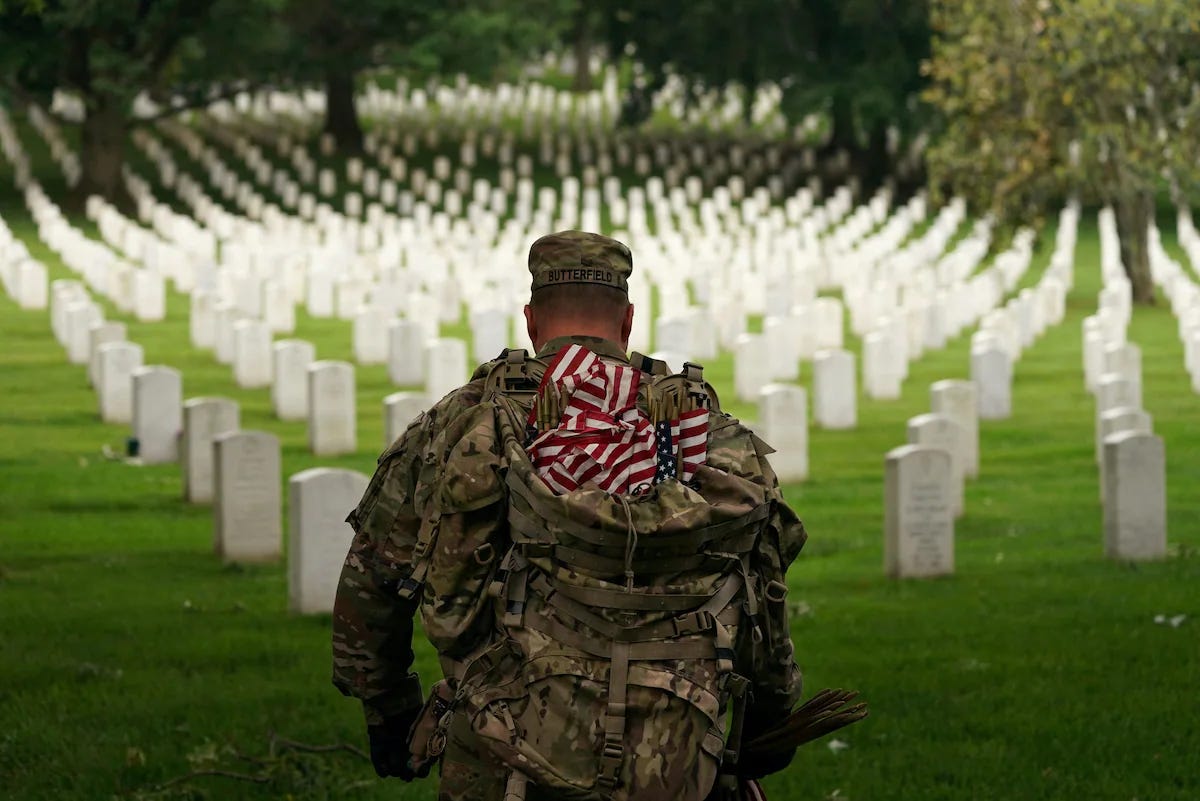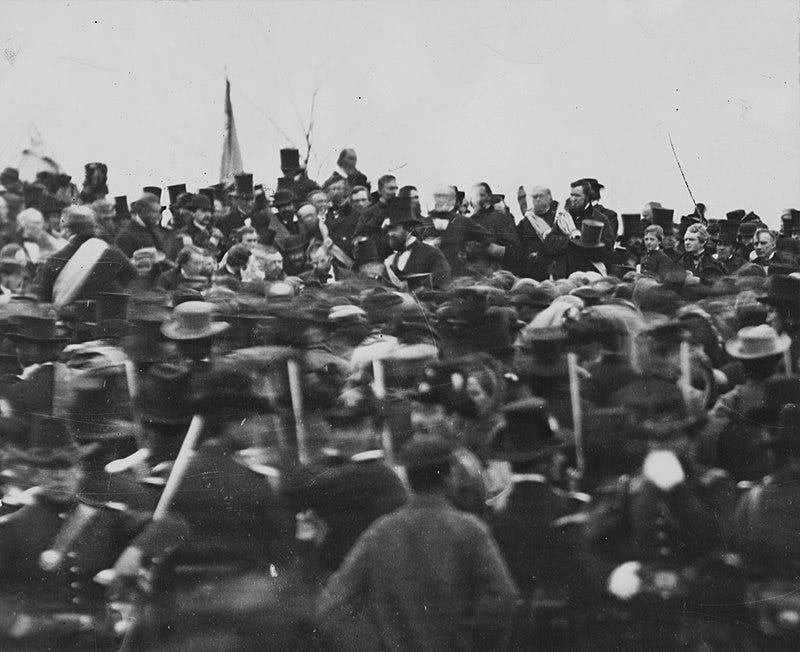Memorial Day, 2024
The Declaration of Independence is the foundational document of the First American Revolution. The Gettysburg Address is the foundational document of the Second American Revolution. We revere both.
Welcome to this installment of Life Its Ownself. Your support encourages me to write and publish regularly. I do not charge for subscriptions so the maximum number of people can read me. Please let me know how I’m doing by feedback by 1) liking, 2) subscribing, 3) sharing with others, and 4) commenting below.
Sunday, May 26, 2024
I am mashing up, with some light edits, the essays I wrote the last two years on the occasion of Memorial Day. I hope you will celebrate the day with the reverence it deserves – and maybe even read the Gettysburg Address.
[A soldier of the 3rd U.S. Infantry Regiment places flags on headstones ahead of Memorial Day at Arlington National Cemetery on May 26, 2023. (Kevin Lamarque/Reuters, via the Washington Post)]
For years now, ever since I became a yuppie professional addicted to NPR, I have always enjoyed the annual ritual of the reading of the Declaration of Independence on the morning of July 4.
I wish that NPR would also organize a reading of the Gettysburg Address on Memorial Day. I believe the Gettysburg Address
perfectly summarizes what Memorial Day is all about; and
is, next to the Declaration and the Constitution, the greatest expression of what it means to be America. And even that is a close call.
The Gettysburg Address was delivered at what was, for all intents and purposes, the first Memorial Day event — the dedication of the national cemetery at Gettysburg. Americans have continued to celebrate Memorial Day in some form or fashion for over 160 years. It started as a way to remember the soldiers who had perished, originally by decorating their gravesites with flowers. For a while, there were different but complementary commemorations in Northern and Southern states, but by 1890 every state had made it a holiday. In 1968, Congress standardized the holiday as “Memorial Day” and moved its observance to the last Monday in May.
As opposed to Veterans Day, which is celebrated November 11, or Armed Forces Day, which is celebrated om the third Saturday in May, Memorial Day honors those who have fallen in battle. About 1.1 million lives have been lost in battle, and except for the Civil War, mostly not on American soil. Memorial Day is thus to have a somber and respectful tone. By the 1880s, the Grand Army of the Republic, a veterans’ fraternal organization, was providing handbooks to local chapters for commemorating the day. The handbooks counseled decorating the graves of the fallen, followed by “a simple and subdued graveyard service involving prayers, short patriotic speeches, and music ... and at the end perhaps a rifle salute.” A later version of the handbook, addressing the practicalities, encouraged family members to "exercise great care" in keeping the veterans sober.
It has become fashionable in modern times to criticize the wars we have fought, and the political leaders whose hubris and poor judgment got and kept us in them. Much of that is well-deserved. But the councils of the mighty did not really matter to Army Doctor Mary Edwards Walker, or Navy Lieutenant JG Weedon Osborne, or Marine Gunnery Sergeant John Canley, or Air Force Captain Lance Sijan, or Coast Guard Signalman First Class Douglas Munro. They were not fighting a great geopolitical chess game, or for booty, or to enslave others. They were doing their duty as they saw their duty to be done.
(Mary Edwards Walker, Weedon Osborne, and John Canley)
(Lance Sijan, Douglas Munro)
Walker was a woman. Canley was Black. Sijan was a Serbian whose father had immigrated to the U.S. Here at home, they did not enjoy all the so-called “blessings of liberty.” They fought not to protect their lived experience, but to defend and advance an ideal.
That’s why, for me, the most magnificent expression of the meaning of Memorial Day is Abraham Lincoln’s Gettysburg Address, which gave a new context and meaning to both the Declaration of Independence and the Constitution. A nation “conceived in Liberty and dedicated to the proposition that all men are created equal.” A war to test whether “any nation, so conceived and so dedicated, can long endure.” An “unfinished work,” a “great task remaining before us.” “A new birth of freedom,” so that “government of the people, by the people, for the people, shall not perish from the earth.”
Lincoln stood on a battlefield where 51,000 people had died in three days, and from that blood and carnage and stench (the deceased, hastily covered over in the July heat, had not all been reburied when the cemetery was dedicated that November) summoned a new meaning for the battle – “that these dead shall not have died in vain” – and a new purpose for the country going forward.
I encourage you to celebrate Memorial Day, in the spirit of honoring those who have given “the last full measure of devotion” to their country, by reading the Gettysburg Address for yourself.
(Lincoln at Gettysburg. He is seated, hatless, below and to the right of the flag. )
Four score and seven years ago our fathers brought forth on this continent, a new nation, conceived in Liberty, and dedicated to the proposition that all men are created equal.
Now we are engaged in a great civil war, testing whether that nation, or any nation so conceived and so dedicated, can long endure. We are met on a great battle-field of that war. We have come to dedicate a portion of that field, as a final resting place for those who here gave their lives that that nation might live. It is altogether fitting and proper that we should do this.
But, in a larger sense, we can not dedicate – we can not consecrate – we can not hallow – this ground. The brave men, living and dead, who struggled here, have consecrated it, far above our poor power to add or detract. The world will little note, nor long remember what we say here, but it can never forget what they did here.
It is for us the living, rather, to be dedicated here to the unfinished work which they who fought here have thus far so nobly advanced. It is rather for us to be here dedicated to the great task remaining before us -- that from these honored dead we take increased devotion to that cause for which they gave the last full measure of devotion -- that we here highly resolve that these dead shall not have died in vain -- that this nation, under God, shall have a new birth of freedom -- and that government of the people, by the people, for the people, shall not perish from the earth.








Both MATX and David Davis mention having to memorize the Gettysburg Address in school. I am sorry I never had to do that, and an memorizing it now. Such a great speech, and the epitome of what America means!
"Hear, Hear!"